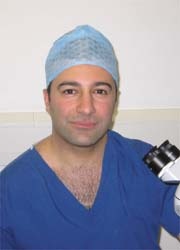Laser eye procedure beats corneal transplants
Report: Mark Nicholls
Specialists at the Imperial College Healthcare NHS Trust, in London, have started using pioneering laser surgery to treat patients with pathological eye conditions, such as superficial corneal scarring.

Consultant ophthalmologist Ali Mearza MD is one of the few UK surgeons trained in both diseases of the cornea and laser refractive surgery. ‘This new technology will transform the treatment of pathological eye conditions,’ he said. ‘Its advantages for certain pathological conditions of the eye that affect the superficial cornea are that the procedure is short, can be done with topical anaesthesia and the visual recovery is much faster than alternative techniques.’ The laser technique takes less than 10 minutes and offers very good clinical outcomes and quicker recovery. The alternative, a corneal transplant, takes more than an hour and has a very long visual recovery time with several potential problems. ‘There’s the risk of rejection, infection, suture complications, glaucoma,’ he pointed out, ‘and it’s also dependent on the availability of donor tissue, with a shortage of that in the UK.’ After the laser procedure, ‘Typically, vision recovers in days to weeks as opposed to months to years for a corneal transplant,’ he said, adding that this is also more cost effective because instead of having an anaesthetist present, topical local anaesthetic drops can be used. In addition, this can be day surgery only and there are fewer post-operative visits.
Kevin Woodward, anaesthetic coordinator and laser protection supervisor, added: ‘Laser eye surgery is well known for correcting vision in people who wear glasses and contact lenses. It is the most common type of surgery that patients choose to have – more than 30 million procedures have been performed worldwide. ‘Only recently the same technology has been used to treat pathological conditions.’
Case: A 58-year-old patient has a rare inherited eye disorder that led to scarring in both corneas. She had undergone two corneal transplant procedures in the right eye and the condition of her left eye was deteriorating, for which she would have been listed for a corneal transplant. Instead, she was one of the first patients to be treated with laser eye surgery at the Imperial College Healthcare NHS Trust. According to the patient, ‘The results are amazing. Within a week, I was back at work and my vision had improved dramatically. With the transplants, I was in a lot of pain and had months off work. After a couple of years, both transplants were being rejected.’ She added that the laser treatment offered real hope for her daughter who has inherited the same condition.
20.11.2008


